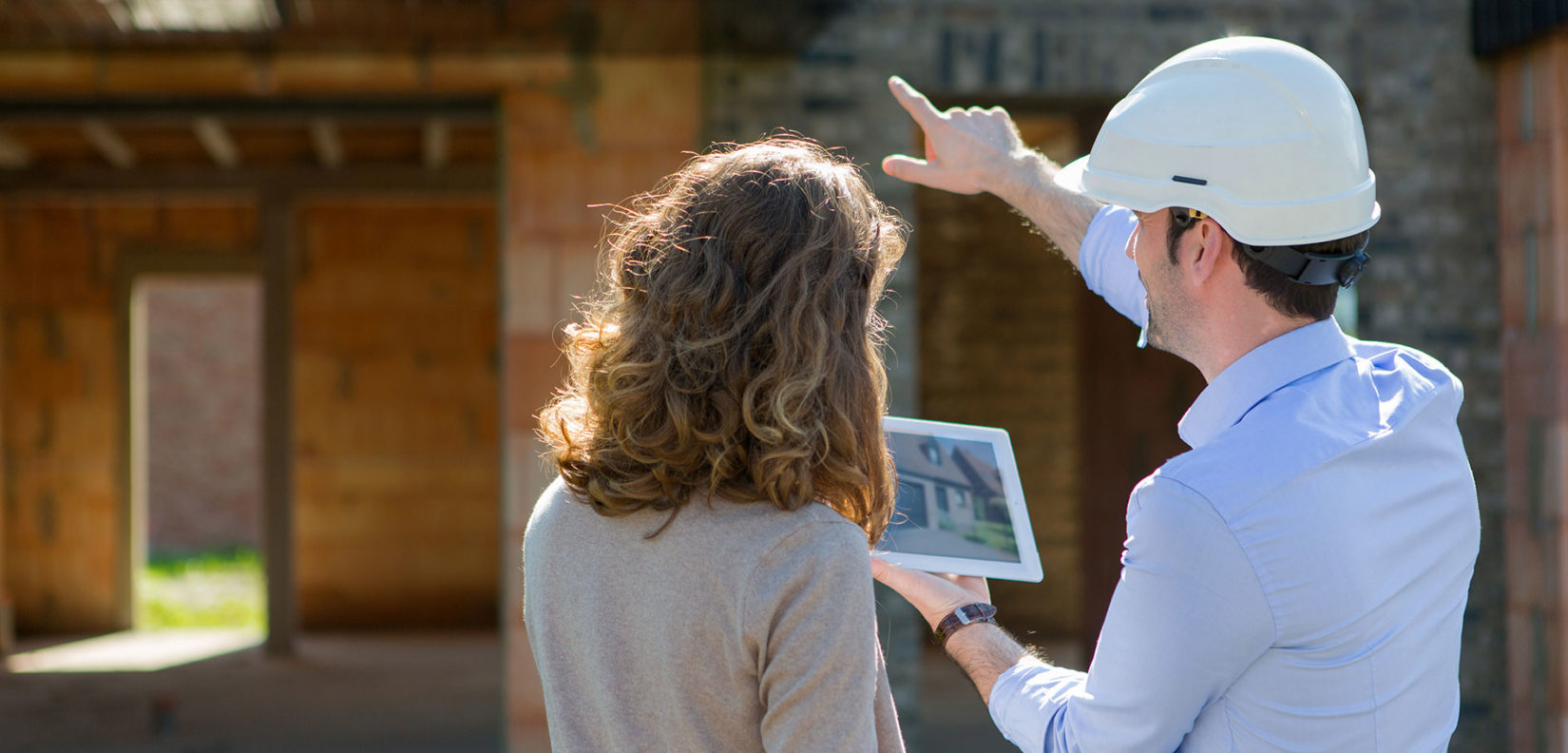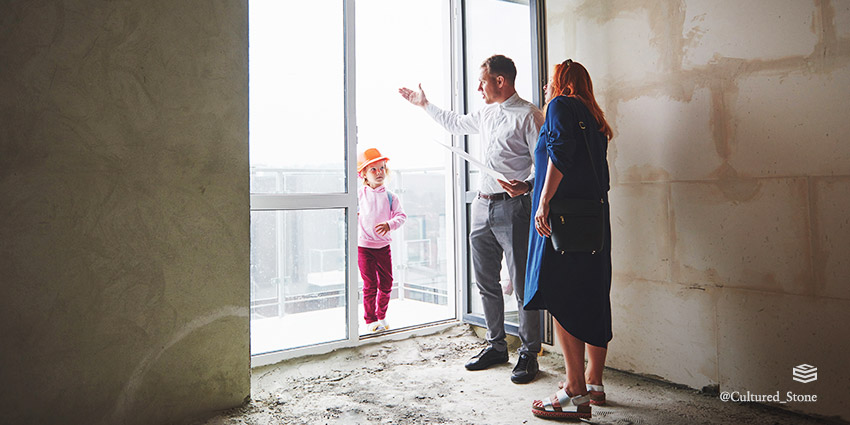10 Questions to Ask Your Architect Before Building Your Custom Home
by Cultured Stone
POSTED IN: Industry Trends

It’s time to get serious about building your custom home. But before you dive in, make sure you understand the process of hiring an architect who is right for your project, your budget, and your timeline.
In this article, you will learn…
- Key questions to ask when shopping for an architect to design your custom home
- How to ask about design costs and potential “add-ons”
- How to manage the homeowner-architect relationship
You’ve been combing through architectural and home design magazines, asking friends and colleagues about favorite architects and builders, and collecting photographs of homes you love. Now it’s time to start the hard work of building that dream home.
Cultured Stone is a trusted resource for homeowners investigating options and materials for new home construction, and we generally advise those looking to do a custom build that the first step is hiring an architect. But how do you find the right architectural firm, and what is the cost of hiring an architect?
Here are 10 questions you should ask as you start interviewing potential design teams for your custom home build project:
1) Can you provide references?
It’s not enough to hire an architect whose buildings you love. Great architecture alone doesn’t tell you the whole story. Ask for references from former clients and contractors with whom your prospective architect has worked. Find out how that architect conducts professional relationships, the level and kind of communication he or she provides clients, and whether or not that person is known for keeping projects on budget.
2) What are your architectural fees for residential projects? And what costs might accrue that aren’t covered in the contract?
Like any design services provider, architectural firms have different ways of charging for design costs. Make sure you understand the firm’s fee structure upfront, and don’t work with a firm that isn’t transparent about its fees. Communicate your budget clearly, and find out early what you can and can’t afford. Quality design work can get expensive quickly, which is why you should also ask about any potential for extra costs—like design changes that come up during construction. Also, don’t be afraid to ask how frequently your prospective architect’s projects come in on or under budget. And then verify that with her clients and contractors.
3) Are you insured, and do any clients have open claims against you?
Your architect’s solvency is critical to your project’s completion. You don’t want to end up working with an architectural firm that has legal challenges and can’t cover those potential costs. Ask for verification that the firm has insurance, find out if any current or former clients have claims against the firm, and find out what those claims are before you sign any contracts.
4) How long will the design and construction processes take?
While you are likely anxious to build and move into your new home, make sure you have a realistic understanding of the timetable involved in a custom design and build project. How long will it take the architect to design your home? A lot of this may depend on how well you know what you want.
It’s also reasonable to ask your architect how long it typically takes to build a home of your size and design standards. Knowing upfront that you’re looking at a two-year project can remove potential stress later and prepare you (and your budget) for the time commitment involved in building a custom home.
Your architect may also be able to provide advice on ways to reduce the project timeline by employing construction methods or materials that decrease labor needs. Examples might include using precast foundation panels as opposed to concrete block or facing foundations, chimneys, and other architectural features in manufactured stone veneer rather than natural stone.
5) How much time and feedback will I need to commit to the project?
Do you prefer to provide your architect with a general idea of your design desires and goals and then let him run with it, or do you want to be deeply involved in the design process?
A little self-awareness goes a long way in the client-architect relationship. Know what kind of client you are. Think about how hands on you want to be. Then make sure your architect can provide a level of service that best meets your needs.
While involved clients often help projects move more quickly, it’s also important that you set a structure for how you’ll be involved. Weekly meetings? Email updates? Discuss what works best for both you and your architect.
6) What are the potential challenges of my building project?
Do you have an unusual building lot shape? Are there special zoning considerations or HOA architectural guidelines in your neighborhood? Does the style of house you desire involve numerous complicated roof pitches? Will your home have special design installations?. How about green building materials?
Ask your architect early in the process if she foresees any particular challenges to your project that might make your homebuilding go over budget or cause difficulties for the builder. Often he/she can suggest alternative options to help you better manage design or building code hurdles, like reducing costs and weight on stone walls by employing manufactured rather than natural stone or establishing a less complex roof line to make for simpler framing and shingling.
7) Who will I be working with at your firm?
Preferably you’ll have one point of contact at the architectural firm you’ve hired, but make sure you know who will be working on your project and with whom you’ll be communicating most frequently. Will it be the project architect or a project manager? Do you have good professional chemistry with the architectural team?
Furthermore, does your architect have established relationships with materials providers like Cultured Stone who can provide supporting advice during the design process? By knowing who is on your team, establishing a solid rapport with them all, and understanding where to go with questions and concerns, your custom home building project will run much more smoothly.
8) Can you recommend a builder?
You may already have a general contractor in mind for your homebuilding project. However, if you don’t, your architect is a good person to ask for references. Many architects have builders with whom they work regularly and have strong professional relationships. They can often provide objective feedback on builder quality, timeliness, and costs.

9) What’s your relationship with the building contractor?
A strong architect-contractor relationship is important. Some homeowners hire architects to design a house, hand the drawings off to the builder, and that’s the end of the relationship. But ideally, your architect will be involved in your homebuilding project through its completion. Ask what role she will play during construction and whether or not she will be your point of contact during the building process or if you will be dealing with the contractor directly.
10) How can I reduce the environmental impact of my project and/or gain greater energy efficiency?
If you’re looking to incorporate sustainable design into your building project or you have energy-saving goals, let the architect know upfront. Often he can offer low to no cost design solutions to make your home more energy efficient just by home siting and passive solar design, for example.
Let your architect know how much you’re willing to spend to increase your home’s energy efficiency and reduce its carbon footprint. And then be sure you understand what the short- and long-term paybacks of those sustainable strategies are. Also be certain your architect has verifiable experience in energy efficient design. Ask about the energy performance of his past projects.
Asking critical questions upfront can save you relationship and design challenges later. Take the hiring of your architect as seriously as you take building the home of your dreams.
For more tips on managing the home building process, download Cultured Stone’s “Are You Ready to Start Building?” checklist.